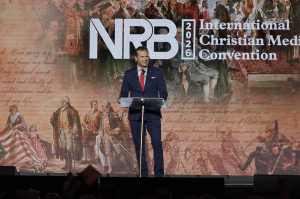Broadcast TV the Next 'HBO or Cinemax' Without Gov't Protection?
Supreme Court decides on indecency law for broadcast television
Broadcast television will become the next HBO or Cinemax unless the U.S. Supreme Court does something about it, a media watchdog group declared.
Supreme Court justices on Tuesday began hearing the oral arguments for the television decency case involving major networks like Fox and ABC. A lower court had ruled that the Federal Communications Commission regulations on broadcast networks were unconstitutional.
The issue at hand was whether or not the FCC’s stricter indecency standards imposed on broadcast television networks during recent years were in violation of the Constitution, specifically the First and Fifth Amendments.
Since 2004, the FCC began placing tougher regulations on broadcast companies for the use of foul language and nudity during prime time programming, or between the hours of 6 a.m. to 10 p.m. when children and families could be watching.
When networks were subjected to large fines upon violation of the decency law, they began to fight back, citing that the FCC’s regulations were “impermissibly vague” and purely subjective. They complained that they were given no fair notice of what the commissioners deemed as indecent prior to being fined.
Major broadcasters also began arguing that they were being denied the same basic First Amendment freedoms allotted to other media, such as the Internet and cable TV, which did not face the same FCC regulations because it was privately owned.
“For more than 30 years, broadcasting alone among all mass media has become a second-class citizen,” the major television companies stated in their brief. “Only broadcasting is subject to content-based censorship by the federal government, simply because this Court ... believed that broadcasting was at the time unique, and thus uniquely without full First Amendment protection.”
Over the past three decades, however, the media marketplace had changed dramatically, the networks shared, eliminating the need for government regulations on broadcast television content.
“To the average American viewer, broadcasting is just one source among hundreds in a media-saturated environment, a mere press of a button on the remote control away from other, fully protected sources. The day has come for the FCC’s indecency regime to be subjected to the same strict standards that apply to all government attempts to abridge freedom of speech.”
The Parents Television Council, an organization involved in the decency case from the beginning, however, argued that radio and television broadcasters had the ability to be “as indecent as they [wanted] after 10 p.m.”
“The creative community has unlimited access to distribute even the most edgy content across other forms of media,” Tim Winter, the PTC president, shared in a statement. “But now the networks are demanding that they be given the benefits of the free use of the publicly-owned airwaves without the longstanding public interest obligations that come with a broadcast license.”
“If the Supreme Court rules in favor of the networks, the American people are going to get a rude awakening when broadcast TV becomes indistinguishable from Cinemax, HBO or something even more explicit. Children, parents, families and indeed all Americans deserve better use of the airwaves that they own,” said Winter.
He believes that if the Supreme Court overturns the regulations, the door would be opened for the airing of “hardcore pornography at any time of the day,” even when children are watching.
“Decency rules have existed since the dawn of broadcast media,” the PTC president noted. “The broadcast airwaves are still uniquely pervasive. We urge the High Court to look past the TV networks’ smokescreen and side with the public. If the networks get the ‘rights’ they are fighting for, the harshest profanity and explicit sexual material will be legal on the publicly-owned airwaves when we know millions of kids are watching.”
The National Religious Broadcasters, also in support of the FCC, stated in their brief, “Admittedly, NRB believes that as a general rule the Commission should leave broadcasters, including religious stations, free to produce and generate broadcast content without unnecessary or unreasonable interference.”
“On the other hand, NRB believes that the welfare of America, its families, and its youth, will be detrimentally affected by electronic mass communications which are allowed to contain, during children’s viewing hours of 6 a.m. to 10 p.m., unrestrained indecency, whether in language or imagery.”
Morality in Media, another watchdog organization, argued that the FCC’s definition of indecent was not unconstitutionally vague like the networks have accused, with several courts repeatedly affirming their definition.
They also expressed that broadcast media was still uniquely pervasive and readily accessible to children, requiring the government to play a necessary “protective role.”
Following the Supreme Court arguments on Tuesday, Melissa Henson, director of Communications and Public Education for the PTC, told The Christian Post that broadcasters will continue to aggressively work toward obliterating all remaining taboos for television.
“As a society, we’re already becoming desensitized to things we should be outraged by,” she continued. “We tolerate incivility; we accept sexual permissiveness and promiscuity as ‘normal;’ we turn a blind eye, or worse, laugh, when someone is suffering or hurt.”
“Studies show that children exposed to violent content become more aggressive; children exposed to foul language are more aggressive; children exposed to sexual content are more likely to be involved in a pregnancy before they finish high school.”
“Television allows that desensitization to happen,” Henson concluded.



























